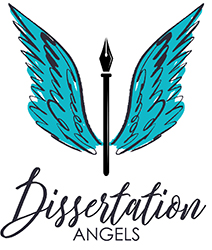Dealing with criticism is a part of life. Whether you’re a child who’s parents are criticizing your clothing choices or an adult who’s being grilled by your boss in an annual employee review, criticism is an unavoidable experience for most people — especially those who strive for growth and achievement. The way people perceive and react to criticism is a large determinant of outward success. You can either get knocked down by criticism, feel insignificant and stupid when you experience it… or you can use it as a tool to push yourself to the next level. Yes, criticism can be a powerful catalyst for positive change if you know how to use it to your advantage.
I wanted to touch on criticism in this post because over the years, I’ve noticed it’s something that a lot of my clients struggle with. And I get it. When you’ve poured yourself into something as all-consuming as a dissertation, you want to hear positive feedback on your efforts, right? An attaboy or attagirl once in a while. A pat on the back. A thumbs up. Perhaps some words of encouragement from your chair or committee members. You’d like something nice from your academic gatekeepers to keep you motivated and inspired.
While there are the lucky few who get chairs who are naturally encouraging and nurturing, my experience over the last few years of working with over 100 dissertation clients indicates this is far from the norm. Usually the feedback doctoral students receive on their dissertations is pointed, critical, and often harsh. Sometimes, it’s unprofessional. Often, it’s contradictory. At times, it may reveal a chair or committee member who either (a) isn’t reading submissions, (b) doesn’t have a good grasp on a student’s topic or methods, or (c) both. Certainly, it can be hard to resist a gut-level response out of frustration or confusion when you receive biting criticism or unclear feedback – especially when you don’t have the option of ignoring the criticism. This isn’t like a friend making a snarky comment about your ugly shoes, it’s criticism you must deal with, from someone who holds the keys to your academic future (eek). Worse, if you’ve received criticism that is simply wrong (for example, you’ve got a chair who doesn’t understand how a hypothesis should be written, or doesn’t understand the differences between two different qualitative designs — but thinks they do), it can feel like your hands are tied. How do you politely and diplomatically tell your chair that he or she is wrong about something? I’m going to address that in a future post, but for now, let’s just focus on dealing with your responses to the criticism.
Here’s the deal – you have two options in how you perceive and react to criticism (no matter how much the feedback convinces you that your chair is from outer space). You can either:
1. Take it personal, have a meltdown, throw your hands up in the air while cursing your good-for-nothing chair and wondering why you ever decided to write a dissertation in the first place,
OR, you can
2. Breathe, keep it in perspective, recognize that the criticism is of your paper, not you, and create a plan of action for dealing with it.
Often, by the time a student comes to me for assistance, they’re so gun-shy from the iterations that are inherent to the dissertation process than any little snippet of criticism feels overwhelming. But it is critical that you don’t allow yourself to get rattled or stressed out. Remember that criticism is not just part of life, but it’s essential to good scholarship. Let’s say you have an unnecessarily difficult chair who is irritating the living daylights out of you with the comment feature in Word – you’ve got to stay in control of the way you perceive and respond to those grating little comments. Ask for clarification when you need it and don’t be afraid to stand your ground if the revisions your chair wants you to make are contradictory to your vision or research purpose (it is, after all, your study). If you push back politely, and provide a logical, supported argument for your decisions, you might be surprised by a positive response (again, more on how to do this, later).
Sound off to a friend or fellow scholar if you need to (people who can empathize with the experience are best), but stay focused on your goals. Step away, take a walk, close the laptop for the evening, but don’t let the criticism sink into you on any type of personal level – that’s just not necessary. I believe that perspective is everything. Keep yours in check and the dissertation journey will be much less frustrating!
